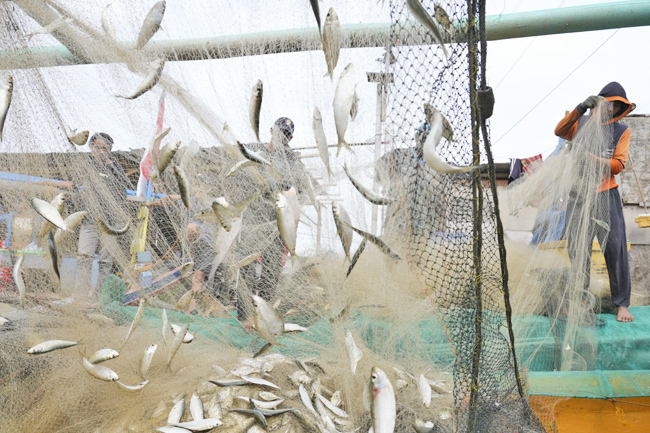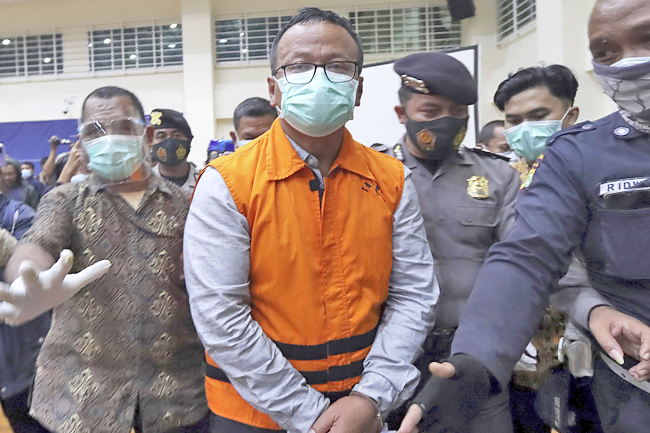Fu Ting, Grace Ekpu & Helen Wieffering
WASHINGTON (AP) – As Indonesia’s fisheries minister Edhy Prabowo was tasked with protecting one of his country’s most precious resources: baby lobsters so tiny one can fit on the tip of a finger.
The waters off the nation’s many islands and archipelagos had once teemed with lobster. But overfishing in recent decades decimated the crustacean’s population, so much so that fishermen turned to catching the hatchlings. They scooped them up by the thousand and shipped them to Vietnamese lobster farms, where the babies are raised to adulthood and sold mostly to dealers in China to meet its enormous demand for seafood.
Concerned that such harvesting was harming lobster populations, Indonesia’s Fishing Ministry in 2016 prohibited the export of the tiny crustaceans. Shortly after taking office, Prabowo lifted the ban. Court documents show that just a month later, in June of 2020, the minister accepted a USD77,000 bribe from a seafood supplier to grant it a permit to sell the hatchings abroad.
The money kept flowing. In his short stint as minister, Prabowo accepted bribes of nearly USD2 million. He was arrested in 2020 by Indonesian authorities, having used the graft to purchase 26 road bikes, Old Navy children’s clothes, Louis Vuitton bags, Rolex watches and two luxury pens. Prabowo, 50, was sentenced to five years in prison for corruption. His attorney declined to comment.
Prabowo’s case is not an outlier. It’s emblematic of the corruption plaguing dozens of coastal developing countries that play a key role in managing some of the world’s most threatened fishing grounds, according to experts and a review of criminal case files and media reports by the AP.


At least 45 government officials have been accused of corruption in the past two decades, the AP found. The allegations range from high-ranking officials like Prabowo accepting large payments from fishing companies to obtain lucrative contracts to low-level civil servants accepting a few thousand dollars to ignore fishermen bringing illegal catch ashore.
“Fisheries corruption can have devastating impacts on marine ecosystems and local communities that may depend on them,” said manager Ben Freitas of ocean policy at the World Wildlife Fund, based in Washington.
“Countries with weak governments that lack oversight and accountability are more susceptible to corruption risk. And that is where fisheries corruption plays a pernicious role in overfishing. It can lead to the over-exploitation of resources. It is a global problem.”
The situation is most critical in areas managed by developing nations because many industrialised countries have already overfished their own waters, forcing them to dispatch fleets of trawlers across the globe to meet growing seafood demand. People worldwide consume twice as much seafood as they did five decades ago, according to United Nations (UN) estimates, and 35 per cent of stocks are considered overfished, up from 10 per cent.
Many coastal developing countries depend on fish for millions of jobs and to meet the dietary needs of their populations. The UN Office on Drugs and Crime warned in a 2019 report that failing to tackle corruption will lead to “significant financial, environmental and societal damages.”
Such corruption, the report added, “negatively affects developing countries in particular”.
Those wishing to conceal their operations or pay bribes to get around restrictions have found fishing to be a welcoming industry.
Companies have little trouble changing the name or flag state of a fishing boat, and it’s common practice to register vessels under shell companies in Liberia or the Marshall Islands. Scofflaw ships are known to turn off their location tracking devices, offload illegally caught fish to other boats, or “launder” it by mixing it with their standard catch.
“The lack of accountability, I think, is even greater in the fisheries sector than it is in other environmental-related activities,” said programme leader Juhani Grossmann at the Basel Institute on Governance, which is working on anti-corruption efforts with Indonesia’s Ministry of Marine Affairs and Fisheries.
At least with illicit lumber operations, Grossmann said, “You don’t have a different shell corporation for every single truck.”
The AP review found that most cases of corruption and graft were low-level schemes, like one in India in which prosecutors last year alleged two fisheries officers extorted USD1,100 to approve subsidies for a fish farm. Another involved fishermen reportedly bribing Malaysian officers with at least USD11,000 for every boat they agreed not to report.
Some are much larger and involve global financial institutions. In 2021, the Swiss bank Credit Suisse admitted to fraudulently financing a massive loan to Mozambique to expand its tuna fishing fleet. A contractor handling the loan paid kickbacks of USD150 million to Mozambican government officials.
Fisheries management adviser who has worked in Africa and South Asia for four decades Stephen Akester said there is a long history of foreign companies – particularly from China – forging corrupt relationships with fisheries officials.
“They exploited the weakness of these governments for whom any kind of revenue was big money, even small dollars,” he said. “And that still continues today.”
In Gambia, a small West African nation nestled along Senegal’s coast, the permanent secretary of the Ministry of Fisheries and Water Resources Bamba Banja was charged in 2021 with accepting a bribe from a Chinese company to free a vessel detained for illegal fishing.
According to charging documents, an employee of Golden Lead Company Limited told Gambian authorities that he and another shareholder in 2018 gave Banja GMD100,000, or about USD1,600, to release the ship. The case is ongoing; Banja’s lawyer told the AP that the fisheries secretary denies any wrongdoing.
Authorities in Namibia allege an Icelandic seafood company paid roughly USD6 million in bribes to Namibian officials to be permitted to fish in the country’s waters. The so-called “Fishrot” scandal first came to light four years ago; Namibia’s former fisheries minister and justice minister are still on trial and have been banned by the State Department from entering the United States (US).
The Icelandic company Samherji has denied committing crimes. In a 2021 statement, it said there had been “a lot of chaos” in its Namibian operations and many expenses weren’t formally documented.
Corruption is not limited to developing countries. A top European fisheries official in 2019 was linked to a criminal network that sought to launder illegally caught bluefin tuna that arrived in Spain from Italy and Malta via French ports.
The director of Malta’s fisheries Andreina Fenech Farrugia remains suspended as investigators with the Spanish Civil Guard probe whether she helped the criminal syndicate bypass European Union (EU) tuna quotas. According to a transcript of a phone call intercepted by police and published by the newspaper El Confidencial, the fisheries director was heard telling a tuna magnate, “You have to pay me.”
Spanish authorities declined to comment on the case. Malta’s Ministry for Agriculture, Fisheries and Animal Rights said that Fenech Farrugia was on unpaid leave. She has not been charged with a crime and could not be reached for comment.
The cases reviewed by AP likely represent a small fraction of the corruption that takes place daily as hauls of seafood are transported and sold around the world.
Most cases go undetected, said professor of public policy at the University of Adelaide Adam Graycar who has spent much of his career studying corruption.
“You have inspectors colluding with fishing boat owners,” he said. “Nobody’s going to tell you what’s happening or give you any data.”
In Ghana, for instance, the Fishing Ministry has been unmarked by any major corruption scandal. Yet the Environmental Justice Foundation, which has investigated abuses in the fishing sector for two decades, issued a report last year documenting how the West African nation has become ensnared in “a culture of corruption in which bribery and intimidation pervades all levels of fisheries management”.
“The environmental and social injustices resulting from the current status quo are myriad, with fishing communities disproportionately bearing the burden of a broken system,” the group concluded.
Kyei Kwadwo Yamoah advocates for better fisheries management in Ghana as convenor of the Fisheries Alliance. In reviewing infractions reported by observers on fishing vessels for a World Bank project in 2016, Yamoah found wide, unexplained gaps in enforcement. The government had penalised some companies, he said, but others were granted a renewed fishing license without question.
“There was no clarity as to why these vessels were not even booked or sanctioned, while there was a clear case of a breach of law,” Yamoah said.
Overfishing and illegal fishing have pushed Ghana’s fish stocks to near collapse, prompting presidential action and putting the livelihoods and the health of millions of Ghanaians at risk.
The situation, Yamoah said, is growing dire: Some days fishermen spend all day on the water and come back with nothing.






